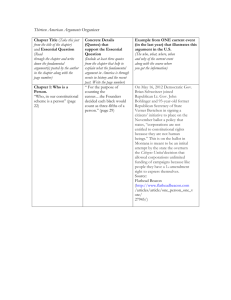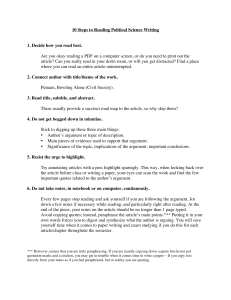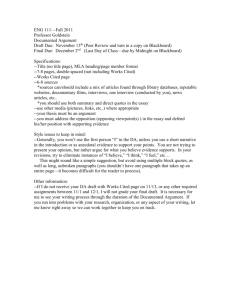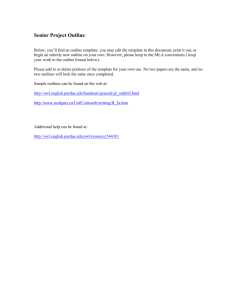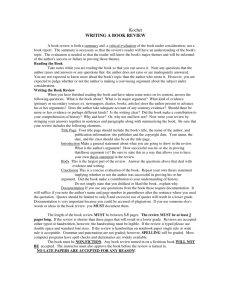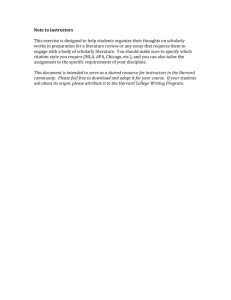Tackling the Big One: Managing and Writing a Longer Research Paper
advertisement
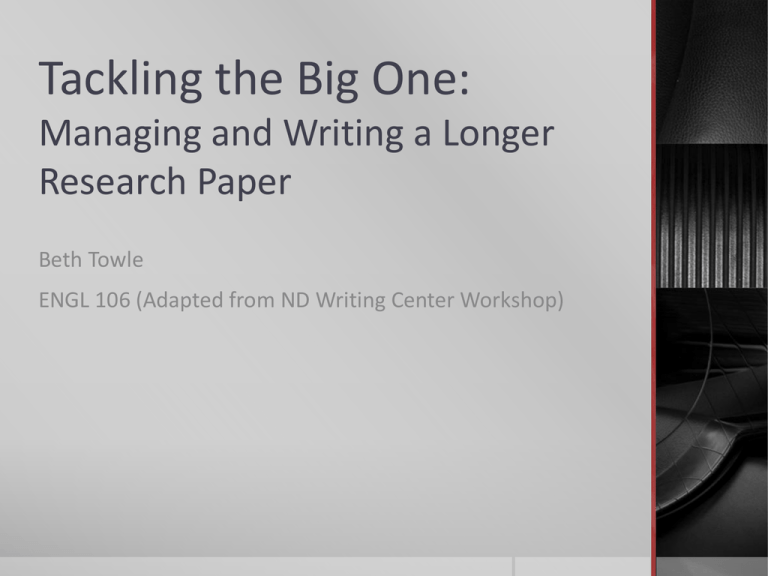
Tackling the Big One: Managing and Writing a Longer Research Paper Beth Towle ENGL 106 (Adapted from ND Writing Center Workshop) What is a Research Paper? An argument that is backed up by outside sources Focuses on a particular topic. Uses primary and secondary sources. Makes claims using evidence/support. Is NOT a collection of other people’s ideas and arguments. Arguments, Claims, Evidence Argument: your central idea or concept This is your thesis Claims: the nods toward the central argument you make throughout the paper; ideas; cannot exist without evidence Evidence: the support needed in order to make a claim This is where the actual research comes into play Quote when direct wording adds to the argument being presented Summarize when the general idea adds to the argument Be selective; only use what is relevant and necessary Pre-Gaming: Planning Your Eventual Paper Decide on a rough topic. Remember that this topic can always be changed or revised later in the process. Begin finding resources. Start big and work your way in: Books > Articles > Visual materials > Reviews/short articles Take advantage of help: reference/subject librarians, instructor, classmates, Writing Lab, etc. Think about the scope of your paper – how big or small an area do you want to focus on? Create a research plan Research Plan of Action Set goals for yourself Example: Write down the dates by which you want to achieve said goals Week 1: begin reviewing sources Keep to the plan of action as closely as possible Week 3: Read/view sources and take notes as you go along; mark exact quotes that might be useful Allow yourself plenty of time for each goal and adjust it to your own needs Week 3.5: Create an annotated bibliography or general resource outline The earlier you start, the better!! Week 2: Narrow down sources Week 4: Begin writing first draft. Week 5: Revise draft. Finding Appropriate Sources Library catalog, databases, WorldCat, internet searches Remember to have a mix of primary and secondary sources Primary sources: original works (surveys, interviews, observations, studies, etc.) Secondary sources: review s and analyses of primary sources (articles, academic books, reviews, etc.) Keep your sources organized: make piles based on usefulness, type, or topic Use the notes/bibliographies/works-cited sections of current sources as a way to find other sources If something doesn’t seem to be that related to your topic, don’t waste time on it!! Organizing Your Research Annotated bibliography Type out appropriate quotes and keep them in their own document; makes it easier to pull them out to use in a paper later. Always include 2 pieces of information in an annotated bib: A brief summary of the source. An explanation of how this source can be used in your paper Langford, Barry. Post-Classical Hollywood: Film Industry, Style and Ideology since 1945. Edinburgh: Edinburgh University Press, 2010. In chapter eight of his book, Langford explores the action film as a vehicle for exhorting the ideological values of masculinity. He explains that culture – in this case, film – is as responsible for distributing ideology as politics. Langford uses the example of action movies to show the ways in which masculinity becomes a kind of national identity. Although Langford’s chapter feels a little anemic, it did get me thinking about how genre expectations in film themselves become important to culturallydisseminated ideologies. Because hyper-masculinity is the norm in action film, and because action films are so popular and economically valuable, they establish hyper-masculinity as a kind of cultural or social ideal. 300 certainly seems guilty of this identity construction. Citation Resources Common styles: MLA, Chicago, APA Style guides Purdue Online Writing Lab: http://owl.english.purdue.edu/owl/ Basic citation rules: Cite when using outside sources Always cite quotes Avoid plagiarism; when in doubt, give credit. Talk to the professor about citation standards in your field Staying Focused, Powering Through Continually think about your thesis or basic argument. If you find yourself straying, figure out why. Should you maybe be writing about this other thing instead? Outline, formal or informal Cite as you go Write a little bit at a time 1 or 2 paragraphs a day go a long way Revise Use available resources – online sites (like the Purdue O.W.L.), Writing Lab, friends and family, instructor, peer review, etc. Basic Writing Tips Clear language; get technical only when appropriate Organization Am I making good transitions? Are my topic sentences easy to find? Is my introduction a good lead-way into my paper? Is my thesis statement easy to find? Does my conclusion wrap things up without presenting anything new and without simply summarizing the paper? Plan on writing at least 2 drafts Reverse outline or outline as you go
